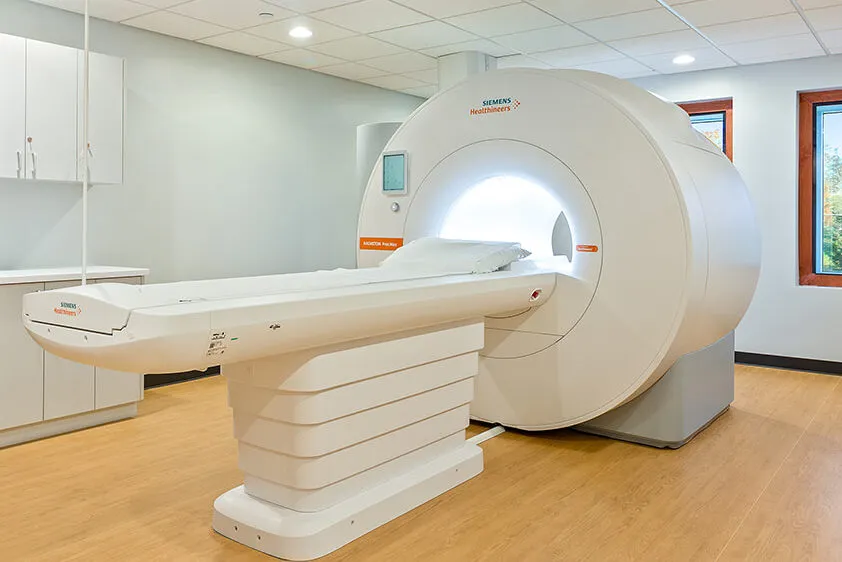
GE HealthCare Unveils SIGNA™ Sprint: A New Era of Ultra-Premium 1.5T MRI Innovation for Cardiology and Oncology Imaging
GE HealthCare has introduced its latest breakthrough in magnetic resonance imaging (MRI) technology, the SIGNA™ Sprint, an ultra-premium, high-performance gradient 1.5T MRI system. Announced at the 2025 International Society for Magnetic Resonance in Medicine (ISMRM) Annual Meeting in Honolulu, Hawaii, the SIGNA Sprint represents a significant leap in diagnostic imaging capabilities, particularly for cardiology, oncology, and advanced clinical research. The system is currently pending FDA 510(k) clearance.
As the demand for advanced imaging solutions continues to escalate, driven by the global burden of cardiovascular diseases and cancer, HealthCare’s SIGNA Sprint aims to address critical clinical needs with precision, speed, and enhanced patient comfort. Cardiovascular diseases remain the leading cause of death worldwide, responsible for approximately 32% of all global fatalities, according to the World Health Organization (WHO). Simultaneously, cancer accounts for nearly 10 million deaths annually, underscoring the pressing need for innovative diagnostic technologies that can support early detection, accurate diagnosis, and effective treatment monitoring.
Expanding the Capabilities of 1.5T MRI Systems
Historically, high-gradient MRI performance has been associated with 3.0T systems, which offer advanced imaging capabilities but often come with trade-offs in terms of cost, accessibility, and patient comfort. The SIGNA Sprint challenges this paradigm by delivering ultra-premium gradient performance within a 1.5T system, designed to democratize access to high-quality imaging without compromising on clinical outcomes.
The system boasts a gradient performance of 65 mT/m amplitude and 200 T/m/s slew rate per axis, enabling fast imaging sequences and exceptional image clarity. These specifications allow for crystal-clear visualization of sub-millimetric structures, which is particularly vital in applications such as tumor characterization, vascular imaging, and neuroimaging. By enhancing diffusion imaging capabilities—a critical tool in oncology for tumor detection and treatment planning—the SIGNA Sprint positions itself as a versatile solution for a broad spectrum of clinical and research applications.
Deep Learning Integration for Precision Diagnostics
At the heart of the SIGNA Sprint’s technological advancements is its integration of deep learning solutions aimed at enhancing diagnostic accuracy and workflow efficiency. The system leverages GE HealthCare’s proprietary AIR™ Recon DL and Sonic DL™ technologies, designed to accelerate image reconstruction while maintaining high fidelity and consistency. These AI-driven tools support clinicians in achieving quantitative MRI assessments, moving beyond traditional anatomical imaging to provide a deeper understanding of tissue characteristics and pathologies.
The adoption of deep-learning-based reconstruction techniques for cardiac MRI is particularly noteworthy. Cardiovascular imaging often requires complex protocols and significant expertise to interpret. By streamlining these processes, the SIGNA Sprint reduces the time and specialized knowledge needed for accurate diagnosis, thereby enhancing accessibility and reducing variability in scan interpretation.
Kelly Londy, CEO of Magnetic Resonance at HealthCare, emphasized the company’s commitment to advancing MRI technology:
“We are driven to push the boundaries of what’s possible in MRI with our ultra-premium segment, as our goal is to set a new standard in diagnostic research and precision care that allows for earlier clinical detection and treatment response. We are working to enhance diagnostic capabilities to provide highly accurate imaging with peace of mind for patients. We hope to help clinicians unlock new horizons for research in advanced imaging.”
Patient-Centric Design: Comfort Meets Performance
Beyond technical specifications, the SIGNA Sprint has been thoughtfully designed with patient comfort as a priority. The system features a 70cm wide bore, providing a more spacious environment that can significantly alleviate the discomfort and anxiety often associated with MRI procedures. Free-breathing imaging capabilities further enhance the patient experience by minimizing the need for breath-holds, which can be challenging for patients with respiratory difficulties, cardiovascular conditions, or pediatric patients.
Another standout feature is the incorporation of HealthCare’s AIR™ Coils, known for their lightweight, flexible, and blanket-like design. These coils conform comfortably to the patient’s body, reducing physical strain and improving overall scan experience without compromising image quality.
AI-Powered Clinical Workflow and Care Pathway Optimization
The SIGNA Sprint is engineered to support precision care throughout the entire patient journey, from initial diagnosis to ongoing treatment monitoring. By integrating AI-powered technologies such as AIR x™ for intelligent slice positioning, the system simplifies scan setup, enhances reproducibility, and optimizes workflow efficiency for radiologists and technologists.
This comprehensive approach aligns with GE HealthCare’s vision of precision health, where data-driven insights and cutting-edge technologies converge to deliver personalized, effective, and patient-friendly care solutions. The system’s capability to handle demanding anatomies with high-quality imaging ensures its applicability across diverse clinical scenarios, from routine exams to complex research protocols.
GE HealthCare’s Broader MRI Portfolio: Innovations at ISMRM 2025
In addition to the SIGNA Sprint, HealthCare showcased several other MRI innovations at ISMRM 2025, reflecting the company’s holistic approach to advancing diagnostic imaging:
- SIGNA™ MAGNUS
A head-only MR scanner designed for high-resolution neuroimaging applications, SIGNA MAGNUS features high signal-to-noise ratio (SNR) capabilities, advanced diffusion-weighted imaging (DWI), and significantly reduced scan times. The system leverages HyperG gradients, among the most efficient gradient coils available, to deliver superior imaging performance for neurological research and clinical care. - Sonic DL™ 3D
Building upon the success of AIR Recon DL, Sonic DL for 3D represents GE HealthCare’s next-generation solution for accelerating MRI scans across multiple clinical applications. This technology harnesses deep learning algorithms to dramatically reduce acquisition times while maintaining diagnostic accuracy, aiming to benefit a wide range of patient populations. - Freelium™ Helium-Free Platform
In development, Freelium represents a sealed, helium-free magnet platform designed to address the environmental and operational challenges associated with traditional MRI systems. By drastically reducing liquid helium usage without compromising on power efficiency or clinical performance, Freelium underscores GE HealthCare’s commitment to sustainability and operational resilience.
A Strategic Leap Towards Accessible Advanced Imaging
The unveiling of SIGNA Sprint marks a strategic move by GE HealthCare to bridge the gap between high-end imaging capabilities and broader clinical accessibility. By delivering 3.0T-like gradient performance in a 1.5T system, the company aims to expand the reach of advanced diagnostic tools to healthcare providers who may face limitations in infrastructure, budget, or patient demographics.
This democratization of technology is especially critical in regions where healthcare resources are constrained, yet the burden of non-communicable diseases like cardiovascular ailments and cancer continues to rise. By offering a cost-effective, high-performance alternative, the SIGNA Sprint has the potential to enhance diagnostic capabilities and improve patient outcomes globally.
Clinical Translation and Research Empowerment
GE HealthCare envisions the SIGNA Sprint not just as a clinical tool but as an enabler of pioneering research. Its high-gradient capabilities, combined with AI-driven imaging solutions, provide a robust platform for translational research in emerging fields such as radiomics, functional MRI (fMRI), and precision oncology.
The system’s versatility allows researchers to push the boundaries of current 1.5T applications, exploring new biomarkers, imaging sequences, and therapeutic monitoring protocols. This dual focus on clinical excellence and research innovation positions SIGNA Sprint as a cornerstone in the future of MRI technology.




